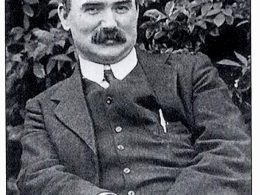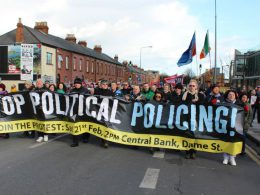The scene seemed set for yet another ‘landmark’ deal in the history of the peace process. The negotiations continued into the early hours of New Year’s Eve. Yet – despite six months of work and 33 days of negotiations and much fanfare – the talks process led by US diplomat Richard Haass failed to reach agreement between the five Assembly Executive parties on how to deal with parades, the past, flags and emblems, with only the nationalist parties endorsing the final draft proposals.
This was despite the extremely limited nature of the proposals, in some cases simply rehashing existing arrangements. The most detailed proposals came on the question of how to deal with the legacy of the Troubles. The draft suggested that the discredited Historical Enquiries Team – found to be investigating killings involving state forces with less rigour than others in a report by HM Inspectorate of Constabulary – be replaced by a Historical Investigations Unit with the same functions! Despite the radical name change, there is no reason to expect the new body would be any more independent from the state than the current body.
No agreement on parades, past, flags or emblems
The establishment of an Independent Commission for Information Retrieval was also proposed. This would allow victims and survivors of the Troubles to receive information regarding their case from combatants, with statements to the Commission being inadmissable in court. Unionist politicians said they could not sign up to the proposals regarding the past due to an over-focus on the role of the state during the Troubles.
Predictably, no proposals of any substance could even be put on paper regarding parades, flags and emblems, the issues which have been the sharp edge of sectarian tension and conflict over the past year. The Parades Commission – perceived by many Protestants to be unduly limiting the right to march – was proposed to be replaced by two bodies – with the combined functions of the Parades Commission! Orange Order chaplain Mervyn Gibson – representing the DUP at the talks – said the proposals were unacceptable because they included a statutory code of conduct for parades, which could potentially put more restrictions on marchers.
Haass was clearly willing to think outside the box on the issue of flags – even raising the idea of a new flag for Northern Ireland! The best that could be achieved in the final draft, however, was a proposal for a Commission on Identity, Culture and Tradition to continue discussion on the public display of flags and emblems – as well as other issues – and formulate more concrete proposals. In other words, the talks proposed more talks, simply kicking the can down the road.
A working group is now to be convened by the Office of the First Minister and Deputy First Minister – although Robinson and McGuinness cannot agree on its purpose. Unionists insist it must continue discussions, while Sinn Féin demands it must simply implement the Haass proposals. Nationalist politicians accuse unionists of being led by the nose by hard-line elements and refusing to make a deal ahead of the local and European elections next May.
Main parties fostering sectarian tension
Undoubtedly, unionist politicians are wary. In December 2012, they cynically tried to use the controversy around the removal of the union flag from City Hall to their political advantage, issuing thousands of leaflets calling on people to come onto the streets and protest. The months of sporadic violence and disruption which followed the decision, however, only demonstrated the disillusionment with the DUP and UUP which exists in working-class Protestant communities – where they are seen as out-of-touch and disinterested – as well as the widespread perception that the peace process has been one-way, with concession after concession to nationalism.
Nationalist politicians cannot take the moral high ground. They, too, played their part in whipping up sectarian tensions around the flags controversy and other events over the past year. For example, Sinn Féin’s decision to hold a commemoration for two IRA members in Castlederg – the village they were on their way to bomb when the device went off – was clearly provocative and a thumb in the eye to the local Protestant community. It was also an attempt to be seen to take a strident position and stem the flow of republican activists away from them and towards dissidents of various hues, although these forces do not pose a significant threat to Sinn Féin’s electoral base at this stage.
It is possible that some deal will be cobbled together after next year’s elections but it will not bring a resolution to these contentious issues – it will be yet another temporary agreement to disagree. These politicians – both unionist and nationalist – stir up tensions around issues like flags and parades when it suits their interests, particularly if they are facing opposition around class issues. They cannot, however, then simply turn down the sectarian temperature when they they want to make a deal. They become hostage to the real frustrations and anger on the ground which they have served to inflame, limiting their room to manoeuvre.
Fundamentally, sectarian politicians who rely on sectarian division for their position cannot bridge the divisions which still exist in our society. Solutions to these difficult issues can only be found by working class people striving to unite around their common interests. While Northern Ireland remains deeply divided and sectarian tensions are mounting, the vast majority of people are absolutely opposed to any return to conflict and there is a growing exasperation at the games being played by the politicians and their failure to genuinely move society forward. Expectations for from the Haass talks were low.
This is coupled with a simmering anger about the cuts which unionist and nationalist politicians are united in implementing, devastating public services and destroying jobs. If the trade union movement were to launch a real fightback against the cuts, they could mobilise huge support from working-class communities. This would tend to push sectarianism to the side and concretely demonstrate the shared interests of ordinary Catholics and Protestants. This could lay the basis for building a new, anti-sectarian political voice for the working-class which – as well as fighting for decent jobs, homes, health and education – could act as a forum to find real solutions to questions such as flags, parades and the legacy of the past.












